In the realm of education, training, and assessment, the importance of well-structured question banks cannot be overstated. Question banks serve as the foundational resource for creating quizzes, exams, and assessments of all kinds. They streamline the process of test development, improve question organization, and enable randomization for fair and unbiased evaluations. To aid exam organizers in this critical task, a variety of question bank builder software solutions have emerged.
- Key Points for Selecting Question Bank Builder Software
- How to Select The Best Question Bank Software?
- Quick Overview of The Best Question Bank Software
- Top 8 Question Bank Builders for Exam Organizers
- How to Manage Your Exam Questions in OnlineExamMaker?
- Question Bank Software FAQ
Key Points for Selecting Question Bank Builder Software
Before we dive into the specifics of each software solution, it’s essential to establish the criteria for selecting the right question bank builder software. Here are the key factors to consider:
1. Ease of Use: Is the software user-friendly and intuitive for educators, trainers, and exam organizers?
2. Question Creation: Does the software provide robust tools for creating a variety of question types, such as multiple-choice, true/false, short answer, and essay questions?
3. Question Organization: Can you efficiently organize questions into categories, topics, or difficulty levels for easy retrieval?
4. Randomization: Does the software offer features for randomizing questions within quizzes or exams, ensuring fairness and preventing cheating?
5. Integration: Is the software compatible with other educational platforms or learning management systems (LMS)?
How to Select The Best Question Bank Software?
An efficient question bank system can help exam organizers save time and increase productivity in teaching and training. Here’s a guide to help you make an informed decision:
User-Friendly Interface
The software should have an intuitive and user-friendly interface. This is crucial for both administrators and users to add questions and manage assessments.
Question Types and Formats
Ensure that the question bank builder supports various question types (multiple choice, true/false, essay, etc.) and formats (text, images, audio, video, etc.). This flexibility allows you to create diverse and engaging assessments.
Scalability
For some enterprises or universities, the exam organizers are required to manage thousands of quiz questions. So consider the scalability of the software to ensure it can handle your current questions base and can easily scale as your institution grows.
Support and Training
Consider the level of customer support and training provided by the software vendor. Adequate support and training resources can help users get the most out of the software and resolve any issues promptly.
Cost Considerations
Evaluate the total cost of ownership, including licensing fees, setup costs, and ongoing maintenance expenses. Compare pricing structures of different solutions and choose one that aligns with your budget.
Quick Overview of The Best Question Bank Software
| Software | Pros | Rating | Pricing | Free Trial |
|---|---|---|---|---|
| OnlineExamMaker | AI Question Generator to generate questions for any topic in seconds | G2, 4.5/5 | $32/month | Signup Free |
| Questionmark | Bring exams to life with real-world stakes | G2, 5.0/5 | Custom | Signup Free |
| Proprofs | AI Question Generator to save you time | G2, 4.4/5 | $20/month | Signup Free |
| Respondus | Webcam video recordings with AI flagging of suspicious behaviors | G2, 2.4/5 | Custom | Free Trial |
| Quizlet | Offline Mode for classroom without network | Capterra, 4.6/5 | $35.99/year | Signup Free |
| Moodle | Open-source and customizable | G2, 4.1/5 | Free | Free Trial |
| EasyTestMaker | Bulk import questions from Word to save setup time | G2, 4.2/5 | $59.95/year | Signup Free |
| TestInvite | Supports up to 12 question types for all kinds of assessment | G2, 4.7/5 | $37/month | Free Demo |
Top 8 Question Bank Builders for Exam Organizers
- 1. OnlineExamMaker
- 2. Questionmark
- 3. ProProfs
- 4. Respondus
- 5. Quizlet
- 6. Moodle
- 7. EasyTestMaker
- 8. TestInvite
1. OnlineExamMaker
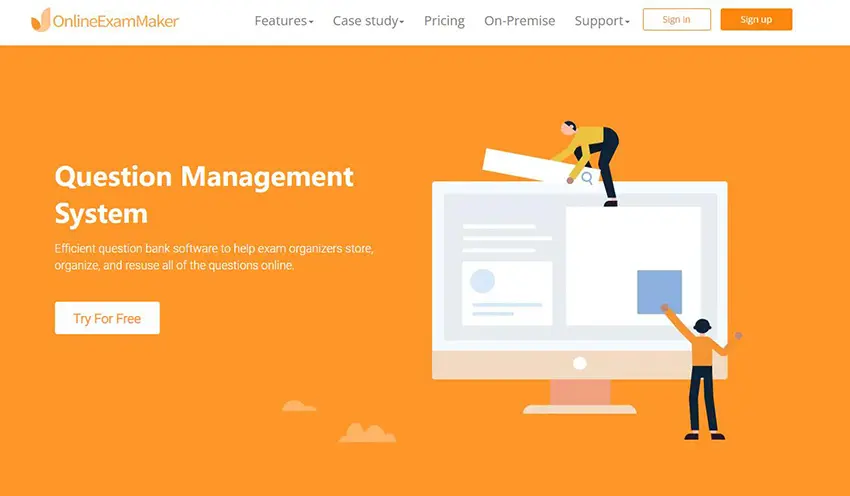
G2 Rating: 4.5/5
Pricing: Free forever. For the paid plans, you can choose the Essentials plan for $32/month, the Professional plan for $49/month, and the Premium plan for $65/month, billed annually.
OnlineExamMaker is a comprehensive question bank builder software designed for educators and institutions. With OnlineExamMaker quiz maker, teachers can easily create, customize, and distribute quizzes with just a few clicks. The all-in-one software provides a range of question types, including multiple-choice, true or false, fill in the blank, and open-ended questions, enabling users to make professional assessments that suit their specific needs.
OnlineExamMaker enable users create unlimited categories to organize or group the questions online. You can edit the category names and store your questions in these categories. If you want to make your quiz more engaging and interactive, you can add video, audio, or images into questions.
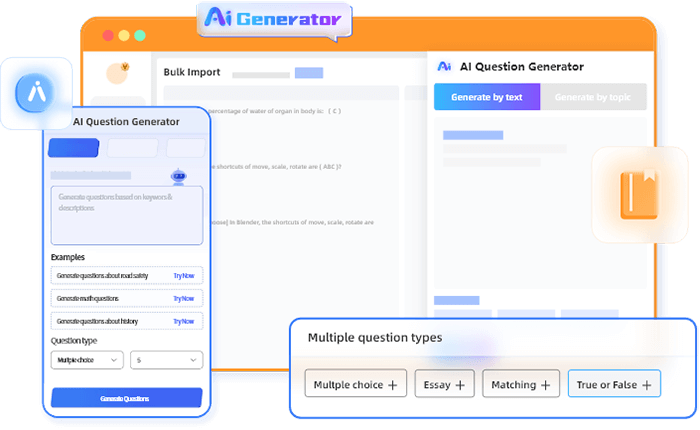
It excels in several key areas:
▶ AI-Powered: Automatically generate questions for any topic according on keyword or texts.
▶ User-Friendly Interface: OnlineExamMaker features an intuitive interface that makes it easy to create and organize questions.
▶ Versatile Question Types: Supports various question types, including multiple-choice, true/false, fill-in-the-blank, and more.
▶ Randomization: OnlineExamMaker offers randomization options, ensuring that each assessment is unique and fair.
▶ LMS Integration: It can seamlessly integrate with popular learning management systems, enhancing its usability.
▶ AI Proctoring Technology: OnlineExamMaker’s proctoring solution observes behavior and detects any anomaly with face and emotion recognition, gaze and voice detection, tab changes, secondary screen and many more
Pros:
▶ Add multiple sub-admins for teamwork in managing questions.
▶ Extensive question type support.
▶ Strong randomization features for preventing cheating.
▶ API and SSO for LMS compatibility.
Cons:
▶ New users may spend time to use some advanced features.
Create Your Next Quiz/Exam with OnlineExamMaker
Check out these related topics of question bank software:
- Top 7 Math Question Bank Software with Mathematical Equations
- Top 10 Question Bank Software for Teachers
- 8 Best Matching Quiz Makers to Create Professional Online Assessments
2. Questionmark
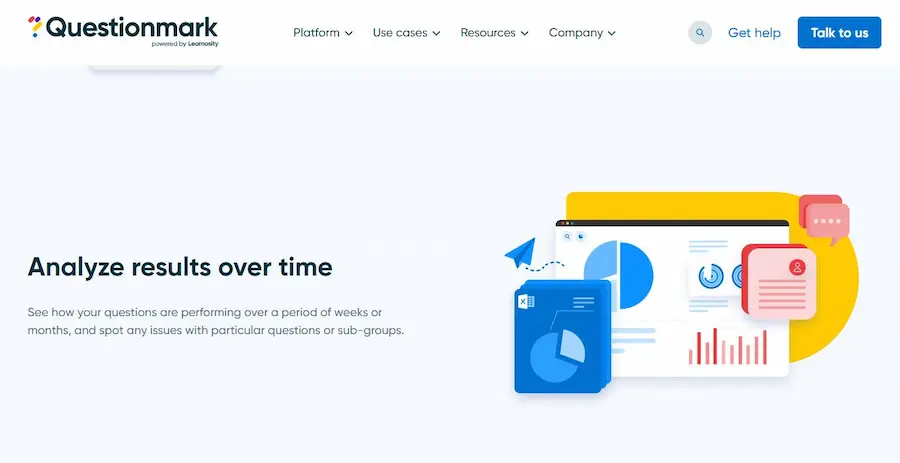
G2 Rating: 5.0/5
Pricing: Free trial. You need to contact Questionmark for a price quote.
Questionmark is a renowned assessment management system that includes a powerful question bank builder. With robust features such as secure browsers, proctoring options, and plagiarism detection, the platform safeguards against cheating and unauthorized access, providing a trustworthy and fair testing environment.
Key features of Questionmark include:
▶ Enterprise-Grade: Designed for large-scale assessments, Questionmark offers a range of features suitable for high-stakes exams.
▶ Advanced Reporting: In-depth analytics and reporting capabilities to help organizations gather insights into participant performance.
▶ Online Proctoring: Remote proctoring to monitor candidate behaviors and prevent cheating.
Pros:
▶ Detailed insights and participant-focused reports.
▶ Proctoring settings to protect your test integrity.
▶ Bring exams to life with real-world stakes.
Cons:
▶ May be complex for smaller organizations or individual educators.
3. ProProfs Quiz Maker

G2 Rating: 4.4/5
Pricing: ESSENTIALS plan, $20/month; BUSINESS plan, $40/month; BUSINESS+ plan, $200/month.
ProProfs Quiz Maker is a versatile tool that offers question bank building capabilities. Whether you’re an educator, trainer, or business professional, Quiz Maker provides an intuitive interface, customization options, multimedia support, assessment tools, and collaboration features. With its flexible pricing plans, ProProfs Quiz Maker is a valuable resource for creating interactive quizzes to assess knowledge, conduct surveys, and enhance learning experiences.
Key features include:
▶ User-Friendly: ProProfs is known for its user-friendly interface, making it accessible for educators and trainers.
▶ Easy Collaboration: It enables collaboration among educators and content creators.
▶ Integration: ProProfs Quiz Maker can integrate with popular learning management systems.
Pros:
▶ Hundreds of pre-made question templates.
▶ AI Question Generator to save you time.
▶ API access for seamless integration.
Cons:
▶ May lack advanced features required for high-stakes exams.
▶ Limited to smaller organizations or individual educators.
4. Respondus
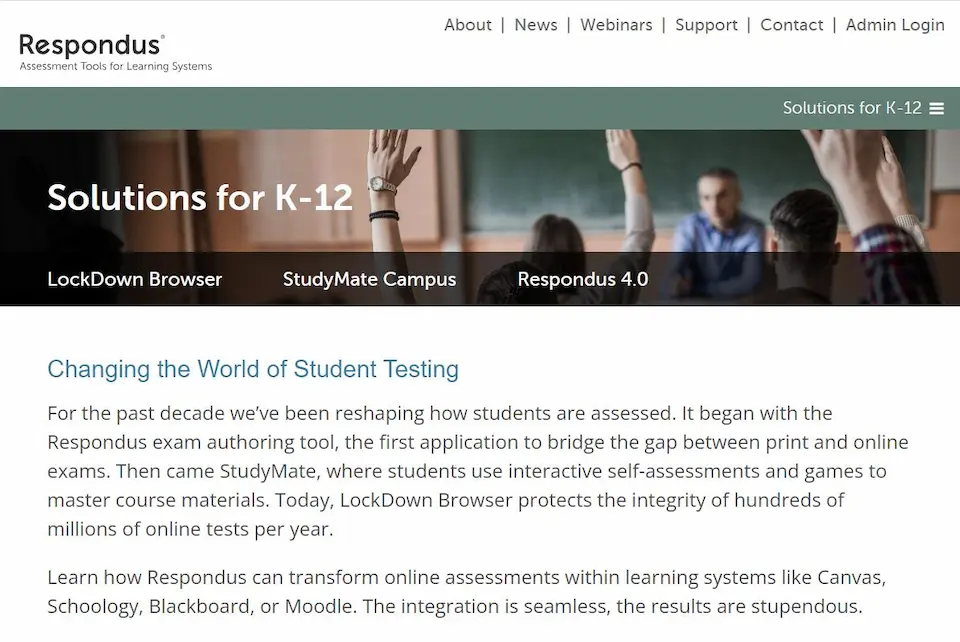
G2 Rating: 2.4/5
Pricing: Custom.
Respondus is a popular assessment development, delivery and security platform designed for educators and administrators in higher education and K12 institutions. The software help teachers create and format quizzes and exams containing various interactive question types and media components.
Its features include:
▶ LMS Integrations: Tight plugins allowing syncing with learning platforms like Canvas, Brightspace, Blackboard, Moodle
▶ Analytics: Detailed item analysis, scoring trends, timing metrics down to granular student levels surface question flaws
▶ Proctoring: Webcam video recordings with AI flagging of suspicious behaviors along with lockdown browser functionalities to prevent cheating
Pros:
▶ Cross-platform: Windows, Mac, Linux.
▶ Efficient import/export features.
▶ Strong security measures for remote proctoring.
Cons:
▶ May not offer as many advanced question creation options as some other solutions.
5. Quizlet
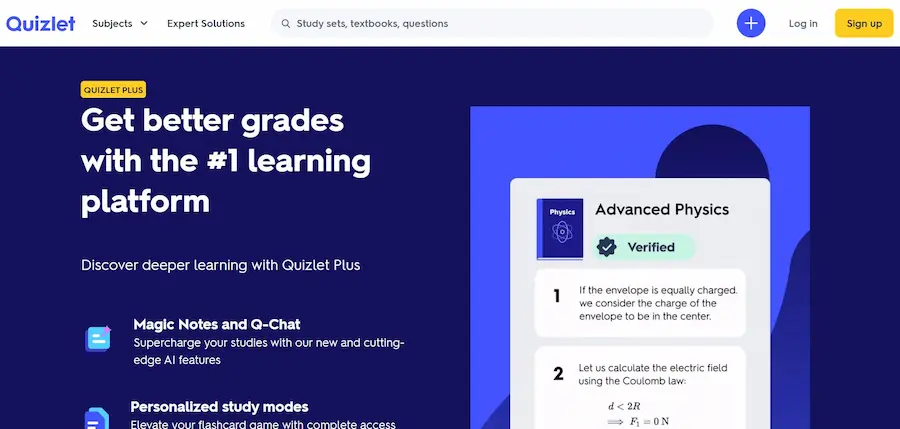
Capterra Rating: 4.6/5
Pricing: 7-day free trial. Quizlet paid plan costs $35.99/year, or $7.99/month.
Quizlet is a versatile and accessible question bank builder software known for its user-friendliness and collaborative features. The platform allows users to create digital flashcards, making it an excellent tool for reinforcing concepts, terms, and vocabulary.
Users can access a vast library of user-generated content, covering virtually any topic imaginable. Additionally, teachers can create private classes, providing a collaborative environment for their students to enhance their understanding. These classes foster engagement, as students can interact, compete, and support each other’s learning journey.
Key highlights include:
▶ Accessibility: Quizlet is accessible to a wide range of users, including students, educators, and trainers.
▶ Collaboration : Encourages collaborative learning by enabling users to create and share question sets.
▶ Gamified Learning: Offers leaderboards and rewards, motivate students to actively participate in their learning journey.
Pros:
▶ Enhance quizzes with rich media.
▶ Monitor individual and class-wide performance in real-time.
▶ Offline Mode for classroom without network.
Cons:
▶ May lack some advanced assessment features.
▶ Primarily suited for educational settings.
6. Moodle
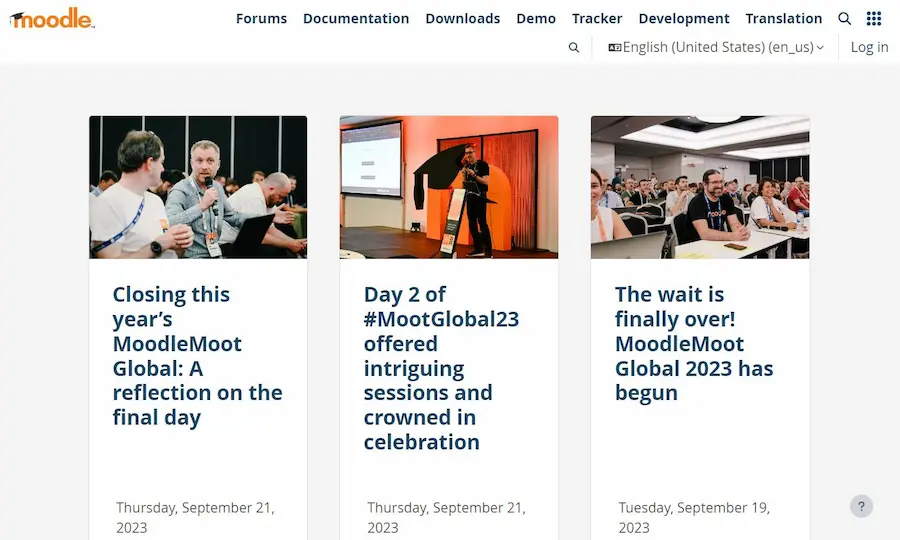
G2 Rating: 4.1/5
Pricing: Open-source, free to use.
Moodle is a popular open-source learning management system that includes question bank builder, online assessment tool, and web proctoring system. The software allows teachers to create auto-graded tests and complex rubrics along with surveys, peer reviews, and quick poll-style questionnaires.
Key features of Moodle include:
▶ Open Source: Moodle is open-source and can be customized to suit specific educational needs.
▶ Plugin Extensions: Over 1,000 plugins available to add new functionality from gamification apps.
▶ Question Customization: Moodle provides extensive question customization options.
Pros:
▶ Open-source and customizable.
▶ Manage assessments and courses in one place.
▶ Allow learners to access courses and assessments on mobile.
Cons:
▶ May require technical expertise to set up and manage.
▶ More suitable for organizations with dedicated IT resources.
7. EasyTestMaker
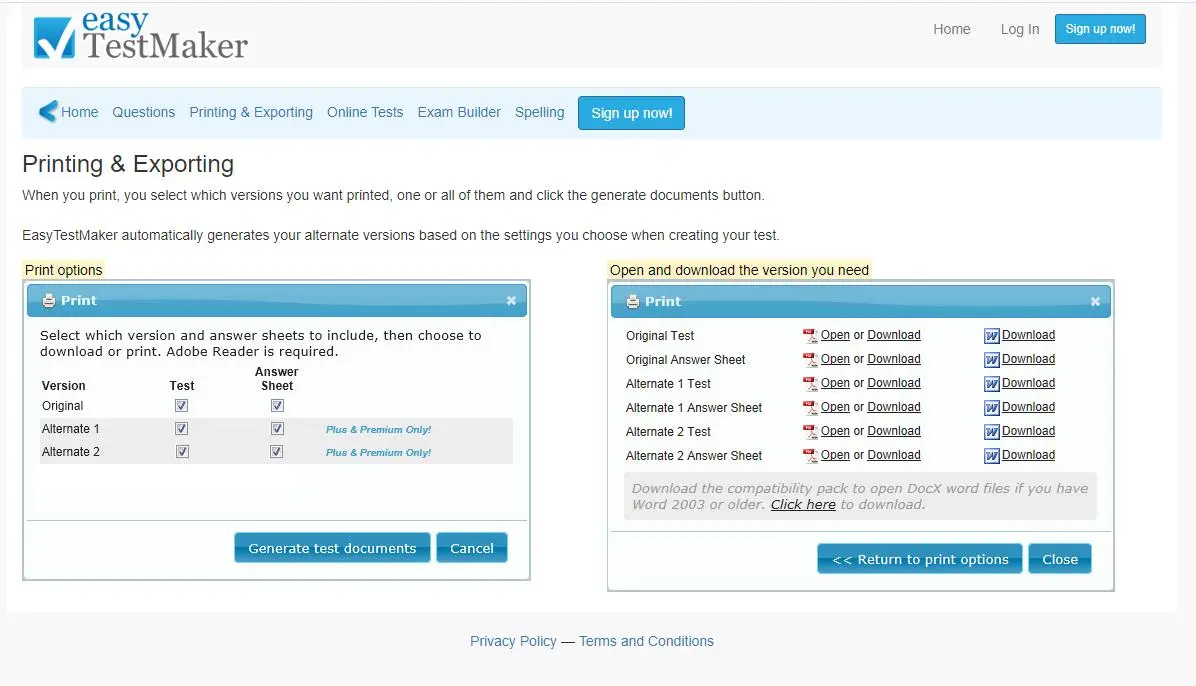
G2 Rating: 4.2/5
Pricing: Free signup. EasyTestMaker provides 3 paid plans, $59.95/year for Plus plan, or $79.95/year for Premium plan.
EasyTestMaker is a lightweight test generator software specifically aimed at teachers, educators and trainers for quickly creating printable tests, quizzes and exams. The software supports multiple question types, including multiple choice, short answer, true/false, fill in the blank, matching and essay questions.
Key features include:
▶ Affordability: Cost-effective platform for all-level schools with limited budgets.
▶ Customizable Layout: Offers flexibility over elements like fonts, margin sizes, number of questions per page etc.
▶ Math & Science Equations: Special equation editor with symbols and grids caters to more technical test content creation.
Pros:
▶ Cost-effective for small businesses.
▶ Bulk import questions from Word to save setup time.
▶ Automatically generate reports with grade performance.
Cons:
▶ May lack some advanced features required for high-stakes assessments.
▶ Limited scalability for larger organizations.
8. TestInvite
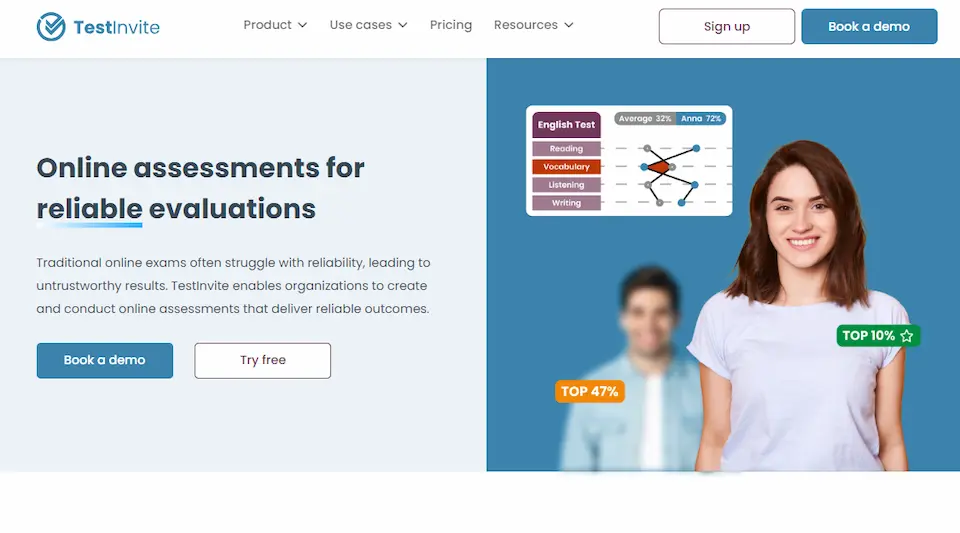
G2 Rating: 4.7/5
Pricing: Free demo. TestInvite offers 3 subscription plans, $37/month for Starter, $79/month for Essential, $159/month for Advanced plan.
TestInvite is a powerful exam platform with question management system that simplifies and enhances the assessment and testing process. With features such as customizable question import, online proctoring, candidate and test management, collaboration tools, and integration capabilities, TestInvite provides a seamless experience for recruiters, educators, and HR professionals.
Key features include:
▶ Anti-cheating: Advanced security measures, including secure browser lockdown and online proctoring.
▶ Mobile testing: Mobile-friendly design for convenient access to tests on any device.
▶ Share results: Seamless result sharing and certification generation for test takers’ achievements.
Pros:
▶ Supports up to 12 question types for all kinds of assessment.
▶ Easily manage questions using question tags.
▶ Instantly generate score for objective questions.
Cons:
▶ Not cost-effective for small business.
▶ New user may take time to learn how to use its advanced features.
Comparison of the Top 8 Question Bank Builder Software
Let’s compare these software solutions based on the criteria we established earlier:
Ease of Use: ProProfs Quiz Maker and EasyTestMaker stand out for their user-friendly interfaces. They are ideal for educators and small organizations looking for simplicity. Respondus excels in LMS integration, making it a valuable choice for those already using LMS platforms.
Question Creation: OnlineExamMaker, Questionmark, and Moodle offer extensive question creation options, suitable for organizations with diverse assessment needs. EasyTestMaker is more straightforward and suitable for educators who need basic question types.
Question Organization: Moodle provides robust question organization features. Questionmark offers advanced reporting and analytics, while Quizlet encourages collaborative learning.
Randomization: OnlineExamMaker, Questionmark, and ProProfs Quiz Maker offer strong randomization features, ensuring fair assessments.
Integration: Respondus and Moodle excel in LMS integration, while ProProfs Quiz Maker and Quizlet offer integration options.
Conclusion
Selecting the right question bank builder software is crucial for exam organizers, educators, and institutions alike. Each of the top 8 solutions discussed here offers unique features and benefits, catering to different needs and budgets.
In the end, the choice of question bank builder software should align with your specific assessment needs, resources, and goals. By carefully evaluating these options, you can streamline the process of exam creation, enhance question organization, and ultimately conduct fair and effective assessments.
How to Manage Your Exam Questions in OnlineExamMaker?
Managing questions in a question bank involves organizing, categorizing, editing, and maintaining a repository of questions for assessments. Here’s a guide on how to effectively manage questions in OnlineExamMaker question bank:
Create question categories
Organize questions into categories and topics based on subjects, chapters, or themes. This helps in maintaining a structured and easily navigable question bank.
Add tags
Assign tags and metadata to questions for easy searching and filtering. Tags can include difficulty level, question type, or any other relevant information that aids in categorization.
Import and export questions in bulk
Easily import questions from external sources (e.g., Word, Excel) and export questions for backup or sharing purposes.
Create question pools
Create question pools for different assessments or exams. This allows you to randomize questions for each test, minimizing the chance of students sharing answers.
Duplicate detection
Implement duplicate detection mechanisms to avoid redundancy. This is crucial for maintaining a clean question bank and preventing confusion during assessments.
Question Bank Software FAQ
What is question bank software?
Question bank software is a tool designed to create, organize, and manage a repository of questions used in assessments, quizzes, exams, and other educational evaluations.
What are the key features of question bank software?
Key features include question creation, categorization, tagging, version control, import/export functionality, collaborative editing, search and retrieval options, feedback mechanisms, and analytics/reporting capabilities.
How does question bank software benefit educators?
Educators can use question bank software to streamline the creation of assessments, ensure question quality, organize questions by topic, and track student performance over time. It also facilitates collaboration among educators.
How can question bank software enhance assessment security?
Security features may include user authentication, access controls, encryption, and audit trails. Some software may also offer features like randomized question selection to prevent cheating.
Is it possible to collaborate on question creation within the software?
Yes, many question bank software solutions support collaborative editing. Educators can work together to create, review, and edit questions, with role-based permissions to control access.
Can questions be exported from the question bank for use in different assessments or courses?
Yes, question bank software typically allows users to export questions in various formats (e.g., CSV, XML). This enables educators to reuse questions in different assessments or share them with colleagues.
How does the software handle different versions of questions?
Version control features enable tracking changes made to questions over time. This ensures a history of edits, and users can revert to previous versions if needed.
Is training and support available for using the question bank software?
Most software vendors offer training resources, documentation, and customer support to assist users in learning and utilizing the features of the question bank software.
How do I ensure the question bank software aligns with my institution’s needs?
Before selecting software, identify your institution’s specific requirements, such as the number of users, types of questions needed, integration preferences, and budget constraints. Evaluate software based on these criteria.